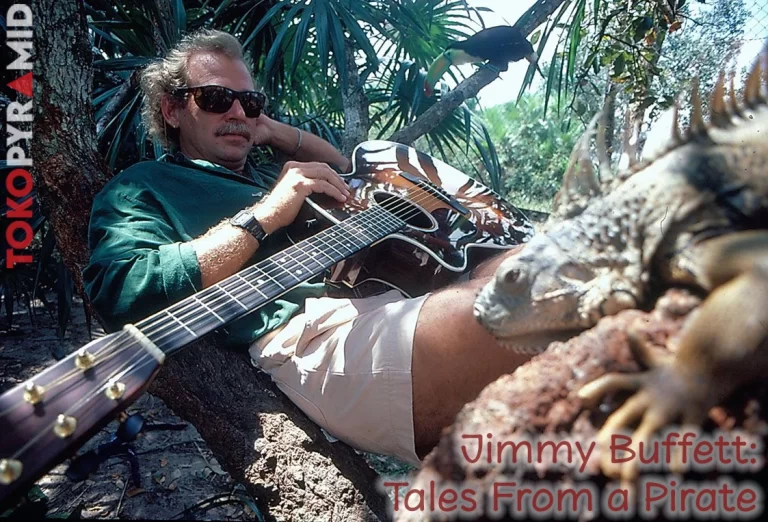No products in the cart.
Jimmy Buffett
Jimmy Buffett: Tales From a Pirate
Jimmy Buffett’s death saddened everyone because everyone was a fan of him. They enjoyed his music and admired the laid-back image he portrayed. He was the easygoing rebel who ended up in paradise, not aiming for much, just looking forward to the next good time.
Don’t be fooled. It was a performance. Please don’t misunderstand me, I appreciate Jimmy Buffett. I like his music, and I’m certain I would relish one of those cheeseburgers in paradise if I ever make it back to Key West.
Jimmy Buffett wasn’t a negative person. He wasn’t similar to those Hollywood celebrities we admire only to discover they were unpleasant individuals. Jimmy Buffett was amiable and approachable. However, he was a representative of Boomer values.
In essence, one could argue that Jimmy Buffett held the title of the Boomer King.
Boomer Generation
The Boomer generation consists of individuals born after World War II. When soldiers returned home, they wanted to move past the war and resume their lives. They started families in large numbers. The U.S. government introduced programs like the G.I. Bill, the Interstate freeway system, and the expansion of suburban housing to assist their transition to civilian life. The economy was thriving. The significant increase in births during this period was termed a Baby Boom, giving rise to the Boomer generation.
The post-World War II years were marked by prosperity. Jobs were abundant, and housing was reasonably priced. New technologies, such as dishwashers, vacuum cleaners, and various gadgets, simplified home life. There was a roast in almost every oven, and a Chevrolet in nearly every driveway. Life was enjoyable.
However, this era of prosperity and happiness had an unintended consequence.
It’s not entirely clear why, but the Boomer generation that came of age in the 1950s seemed to be quite self-centered. It could be that they were overly pampered by parents who having experienced hardship in the impoverished 1920s and 1930s, wanted to provide their children with the resources they lacked. Alternatively, it might have been an inevitable outcome of the prosperous times. Regardless, the Boomer generation developed a significant amount of narcissism.
Jimmy Buffett – The Typical Baby Boomer
During the 1960s, Madison Avenue, the advertising hub, was eager to sell products to the Boomer generation. As they reached the peak of their earning and spending capacity, Boomers became an irresistible market. Initially labeled the Me Generation by Madison Avenue, it was a fitting title as Boomers were notably self-centered, prioritizing their wants and desires.
Jimmy Buffett perfectly embodied the characteristics of the Me Generation. Born in 1946, he epitomized peak Boomer material. Coming of age during the 1960s civil rights movement, Buffett, unlike the activists who were actively engaged in protests, contributed through his music. His main concern regarding police brutality was the fear of being mistaken for a longhair and facing violence while performing at a civil rights rally.
Buffett managed to avoid serving in the Vietnam War using a combination of college deferments, successive university failures, and a failed physical exam. Interestingly, his health didn’t prevent him from embarking on weeks-long sailing adventures around the Caribbean—a physically demanding activity.
After attempting to break into the country music scene in Nashville, which proved challenging due to the closed nature of the industry in the late 1960s, Buffett found his niche during a trip to Key West. At that point in his life, seeking refuge from Nashville and the world, the laid-back island life suited him perfectly.
The Path Leading To Success
It was a life filled with pleasure-seeking. Drugs and sex were abundant, and Jimmy Buffett indulged, much like everyone around him. The idealistic spirit that young people embraced in other parts of America during the 1960s—protesting the Vietnam War and advocating for civil rights—hadn’t reached the southern regions. Life in the Florida Keys revolved around individual desires.
Jimmy Buffett’s time in the Florida Keys was more about seizing an opportunity than genuine affection. Initially aspiring to be a country singer in Nashville, when that dream didn’t materialize, he ended up in the Florida Keys. Later, when the Keys were no longer essential, Buffett moved on, choosing another island retreat—Long Island. This new destination was worlds apart in terms of physical, cultural, and financial aspects.
As soon as he achieved success, Jimmy Buffett traded the flip-flops and sailboats of the Florida Keys for the mansions and chauffeur-driven Rolls Royces of the Hamptons. His residence in Sag Harbor, New York, mirrors the abodes of Wall Street titans—a place where billionaires gather with other billionaires.
Like many Boomers, Jimmy Buffett discovered his true calling in the 1980s: accumulating wealth. The Boomer generation approached wealth creation with unparalleled enthusiasm as if the Me Generation found its ultimate validation in the pursuit of financial success. It became their secular religion.
The 1980s embraced the idea that greed was beneficial. It introduced the Yuppie, or Young Urban Professional, a group focused on amassing wealth. Their extravagant spending habits led to the term “conspicuous consumption”.

Jimmy Buffett enthusiastically embraced this mindset. The carefree, beach-bum lifestyle depicted in his song Margaritaville became an appealing destination for many. He successfully turned this laid-back image into a flourishing business empire.
The Margaritaville concept wasn’t just popular; it was adaptable, extending into various commercial ventures. Starting with the expected elements associated with beach living bars, beer brands, and restaurants—Buffett rapidly expanded his beloved Margaritaville into a diverse business empire, including casinos, sports, retirement communities, and cannabis.
Beyond his music career, Buffett delved into writing best-selling books and making appearances in movies. Notably, there’s a Margaritaville-themed cruise ship, a hit among his fellow Boomers seeking a Caribbean adventure with a bit more comfort than Buffett’s 30-foot sailboat provided.
Jimmy Buffett possessed an incredible gift for creating music and an even more remarkable ability to generate wealth. If he had focused on college during the hazy late 1960s, his business skills could have easily propelled him to the role of CEO in a Fortune 500 company.
Given his natural charm, he might have leveraged his business success into a position in elected office, as many charismatic individuals have done. Could the Mayor of Margaritaville have become President? We’ll never know, but it’s an entertaining thought.
Jimmy Buffett didn’t dedicate himself to grand causes or crusades. He simply had fun and got rich (in that order). Nevertheless, he lived a fulfilling life, enjoying himself and bringing happiness to others. He left behind a legacy-free of scandals. Ultimately, his success can be measured by a simple metric: he brought smiles to far more faces than he did frowns.
Jimmy Buffett was the epitome of the Boomer generation. An authentic American original and he will be missed.
Related Article: 10 Jimmy Buffett T-shirts Will Give You Feeling Like You’re in Margaritaville

























